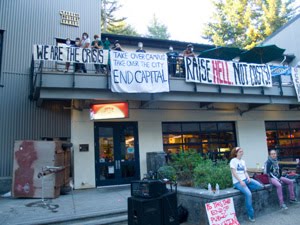December 13, 2009
Capitalist Realism after the crash
 |  |
I'm very grateful for all the kind words about Capitalist Realism, especially the extended reviews from Woebot, Siobhan and Darren.
As to Matt's comments about discussion boards - in a way the very existence of the book is its own answer to those queries. It's almost certainly the case that the book was produced in the same time slots in which I would previously have loitered in comments boxes and on discussion boards. Part of the problem with online debate culture is that it operates on the implicit principle that there is an infinite time to rehearse and nuance positions. But 'debate' time and project time are not compatible; one has to withdraw from the former in order to embark on the latter.
If there was any doubt that capitalist realism has survived the bank crash - or that capitalist realism has nothing to do with 'realism' as such - one need only look at the recent (entirely predictable) display of government cowardice in the face of the RBS directors. All that hot air about the threat of "talent" leaving the bank if they are not paid bonuses.... Such rhetoric played a crucial role in the ludicrous overinflation of business and managerialism over the last thirty years which served as an ideological cover for capital accumulation. (That the adjective "talent" should ever be applied to bankers is condemnation enough of neoliberal culture.) Such puffery ought to have been exploded by the events of the last two years, yet the bankers are being allowed to persist in their fantasies, which are now being sustained at taxpayers' expense. The fantasy that they were "talented" was already exorbitant during the boom - now, when they are exposed as not even competent by any standards that would apply to mere mortals, it is a sick joke. It is like one of those P K Dick stories in which a terrible catastrophe has happened, but a small elite exist in a simulated world, unaware that it has even occurred. But outside the protected pod, workers face ever harsher conditions in the name of the very 'realism' from which the financiers and managerialists are mysteriously exempt.
As ZoneStyxTravelcard pointed out via twitter, the accounts by the pseudonomymous postal worker Roy Mayall of the managerialism tyrannising Royal Mail could have come directly from the pages of Capitalist Realism. See, for example, his LRB diary, an essential account of what is really at stake in the recent postal strikes, as well as his recent blog entry. "The ‘market’," he writes in that blog post, "is essentially a ploy by which one group of people’s interests are imposed on the rest of us. The postal trade is at the front line of a battle between people’s needs and the demands of corporations to make ever increasing profits." It's right to put inverted commas around 'market' here, because, as is well known, supposed 'marketization' has typically functioned as a cover for the super-rich to increase their wealth and for managerialists to impose business ontology on services which previously had other imperatives beyond mere profit. But there are all sorts of unexplored political potentials in the Braudel/D-G/DeLanda conception of capitalism as an anti-market. The Anti-Oedipus point about 'going further in the direct of marketization' is rather hastily dismissed as cryto-neoliberal accelerationism. For instance, it is possible to reframe much of the very interesting discussion about the possibility of a proletarian university in terms of the question of marketization. At the moment, teachers, lecturers and other public servants suffer from asymmetric marketization. We continue to operate as workers in the old Fordist way, whereas students are now 'consumers' and 'clients'. But there are surely many ways in which a more direct market relation between students and teachers - bypassing and obsolescing the managerialist bureaucratic machines which soak up money, energy and other resources - would be much preferable to this worst-of-all-worlds scenario. Consider the situation IT's correspondent Dave describes - "People could pay a small fee depending on the cost of the space etc. People on benefits come for free. Those with jobs pay in full. Students get concessions. Lecturers get paid something." This is a kind of market, one that would be far more sensitive and supple - not to mention egalitarian - than the simulated market imposed on education by managerialists. What if teachers and lecturers operated more like doctors and lawyers, with management reduced to sorting out premises and facilities? At a time when the conventional university sector is increasingly undermining its own status, it is worth thinking quite seriously - and experimentally - in these apparently utopian directions. Instead of working class students getting into debt to take courses that overworked and underpaid lecturers don't want to teach them, why not develop another sort of institution altogether? Why not develop an alternative system of accreditation that could compete with the university system? One reason that the university occupations are a positive development is that they have the potential to themselves instantiate this new kind of institution. Here we have an example of what Peter Hallward calls the "practical sufficiency" of political will - it isn't a matter of petitioning an Other, but of demonstrating the irrelevance of the Other. Here is what universities would look like without managerialsts: much better places. Rather than a protest whose demands could never be met, the occupations start with a set of very determinate demands - reduce the fees - which certainly could be met. But the pursuit of achievable demands engenders practical collectivity which is no longer satisfied with these specific demands, and which - by its very existence - is already pointing beyond them.
Thinking in these ways can contribute to solving the problem that Roy Mayall's blog post seeks to address - the lure of nostalgia; or, rather, the accusation that any opposition to managerialism is a hankering for the past. Robert McCrum's review of Mayall's book is not, however, some perverse misinterpretation; it is rather a symptom of capitalist realism, which has successfully imposed that opposition. The postal workers lost ground when they allowed the strike to be narrativized as being "against modernization". What is needed, rather, is workers to reclaim modernization for themselves, because, as Darren comments, "nostalgic melancholy" and "bitter condemnatory memories" are of no political use. We have to write for "‘the people to come’, for an indeterminate future" because "it is only by doing so that one can ever begin to truly alter the present."
Posted by mark at December 13, 2009 05:07 PM | TrackBack